-

新人教版高中英语必修3Unit 5 The Value of Money- Discovering Useful Structure教学设计
Step 3 Meaning1. 过去将来时表示从过去某一时间来看将要发生的动作或存在的状态, 常用在宾语从句中。一般由“would/should +动词原形”构成。She hoped that they would meet again someday. 她希望将来有一天他们能再见面。2. was/were going to+动词原形: 表示过去将要发生或很有可能发生的动作, 常用于口语中, 表示预言、意图或者打算等。He was going to start work the following week. 他打算下星期开始工作。3. was/were about to do: 常用来表示即将发生的动作, “刚要/正要做……”。注意该结构不与任何时间状语连用。I felt that something terrible was about to happen. 我感到某种可怕的事情即将发生。4.was/were to do: 表示“曾计划做某事”, 如果表示“本来计划做某事, 动作没实现”, 则需用 “was/were to have done”。She said she was to have told me about the accident. 她说她本来想告诉我关于事故的事。5.Start, go, come, leave, see, meet等动词的过去进行时: 表示就过去某一时刻而言即将发生的动作。She was coming later. 她随后就来。I had just put on my overcoat and was leaving to visit a friend of mine. 我刚穿上外套要去看我的一个朋友。

新人教版高中英语必修3Unit 5 The Value of Money-Listening &Speaking&Talking教学设计
4. A:We’d like to have someone to say a word at the beginning to welcome the group.B:↙Who?A:We thought that you or Dr.Johnson might do it.B用降调说Who,其意思是问,对方想让谁在开场时致欢迎词。Step 6 Pronunciation---Practice1. Listen to the short conversation and mark the intonation with ↗, ↙ or ↙, ↗. Then discuss with a partner what they intend to convey by using different intonation.Owner: You know what ?↗ It’s a million-pound bank note↙.Waiter 1: Really ?↗(question)Waiter 2: Really !↙(unbelievable and surprised)Waiter 3: Really ?!↙↗(first question then surprised)2. Listen to the conversations. Underline the parts that are stressed and mark the intonation. Then talk about the implied meanings of the responses with different intonations. Listen again and repeat.1) Henry: It’s a nice suit.Owner: Oh, it’s perfect!↙(The intonation means it is very suitable for Henry.)2) Henry: Well, that’s very kind of you.Owner: Kind, sir ?↗(what you said is not right) No, it’s kind of you. You must come whenever you want and have whatever you like. Just having you sit here is a great honour !!↙(welcome you to come again)3)Henry:Well, to be honest, I have none. Oliver:(happily) What luck!(excited) Brother↗, what luck!↙(It means “Didn’t you hear it?”)Henry: Well, it may seem lucky to you but not to me!↗(angry) If this is your idea of some kind of joke, I don’t think it’s very funny. Now if you’ll excuse me, I ought to be on my way.↙(If so, I would leave.)Roderick: Please don’t go↙...(hope Henry can wait for a moment)Part B Viewing and Talking---Describe people’s changing attitudes in a film clipStep 1 Before-listening---Tell the filmYou are going to watch part of the film The Million Pound Bank Note. Look at these photos and guess what happens in the film.

新人教版高中英语必修3Unit 5 The Value of Money-Listening &Speaking教学设计
Step 4: Listen again and decide if the following statements are true (T) or false (F).1 It was the first time Chen Liyan's story was reported. T口 F口2 Chen found 10,000 yuan in a small plastic bag in Taiyuan railway station口 F口3 Wang Zheng apologized to Chen because he couldn't offer her more money. T口 F口4 Chen took out a large loan to cure her daughter, T口 F口5 Wang set up a fundraising website for Chen's daughter after Chen told him about her situation. T口 F口Step 5:After listening, discuss the questions.1 What kind of person do you think Chen Liyan is?Chen Liyan is generous and honest because she returned a large sum of money to the owner.2 Did Chen return the money because she didn't need it?No. She returned the money because it was the right thing to do. Evidence for this is that she refused to accept the reward money because she felt that it had not been earned. 3 Is it common for people to do what Chen did?It depends on the culture. In some countries it is quite common to return money that has been found. In other countries, people believe "Finders are keepers!" 4 How did Wang Zheng feel about the return of his money?He must have been very happy and relieved to have gotten his money back. We know this because he thanked Chen repeatedly and even offered her a reward.5 Why did Ma Dongbao tell Wang about Chen's family?He must have had great sympathy for Chen and her daughter and wanted to help them.'We know this because he arranged help for them. 6 How did the news reporter feel about Chen's actions?The news reporter felt that it showed that money wasn't the most important thing in life. We know this because the reporter told us that this is what Chen believes. and then said, “that's a great attitude to take."

新人教版高中英语必修3Unit 5 The value of money-Reading and Thinking教学设计二
? Could you offer me some kind of work here?? I don’t want your charity, I just want an honest job.? Careless: I landed in Britain by accident.Step 7:Consolidation.? Find Henry? Roderick and Oliver were I .making a bet when they saw Henry, a poor young man. ? Know Henry? About a month ago, Henry was sailing and later he found himself carried out to sea by a strong wind. Fortunately, he 2.was spotted by a ship. And it was the ship that brought him to 3.England? Offer money to Henry ? Oliver and Roderick gave Henry a letter and told him that there was money in it. They 4.persuaded him to accept it, and made him 5.promise that it wouldn't be opened until 2 o'clock.Step 8:Language pointsa large amount of: a large quantity of; a great deal ofe.g. They bought a large amount of furniture before they moved their new house.make a bet: make an arrangement to risk money, etc. on an event of which the result is doubtful.e.g. We made a bet on the result of the match.permit sb to do something: allow somebody to do somethinge.g. My mother doesn’t permit me to ride in the street after it rained.by accident: as a result of chancee.g. I only found it by accident.stare at: look at somebody or something with the eyes wide open in a fixed gaze( in astonishment, wonder, fear, etc)to be honest: to tell you the truth; to be franke.g. To be honest, I don’t think we have a chance of winning.Step7 Homework:What do you think will happen to Henry? Will the bank-note help him or get him into trouble?

新人教版高中英语必修3Unit 5 The Value of Money-Reading and Thinking教学设计一
Everybody wants to get wealth.In today’s material world,making money or becoming wealthy symbolizes a person’s success and capability. Many people just make every effort, pay any price to attain greater wealth. With money,they can buy nice, large apartments in nice neighborhood. With money they can own luxurious cars. Wealth seems to bring all happiness in life.But is wealth the only road to happiness? Not really. There are many things in the world, which are beyond the means of money, such as friendship, love, health and knowledge. People are so preoccupied with struggling for money that they have no time or would not take the time to form or maintain friendship. What happiness can they feel living as lonely miserable creatures without love or friends in the world even if they accumulate tremendous wealth?In my opinion, people can’t do anything without money, but money is not everything. What money will bring you depends on your personal belief and goal in life. If you are kind enough to help others, especially the poor, money is a good thing to you. With it, you can do much more for the benefit of people and your country, and it will add to your own happiness. If you want money just for your own needs, you’ll never be satisfied or happy. In a word,you should have money spent for more people. Only then can money be the source of your happiness.Step 8 Homework4 students in a group, one acts Roderick, one Oliver, one servant and the fourth one acts Henry Adams, then listen to the tape, pay more attention to the difference between American English and British English in pronunciation, stress, tone.

新人教版高中英语必修3Unit 5 The Value of Money-Reading for Writing教学设计二
2. 您能看到, 我头发太长了。You can see that my hair is much too long.3. 无论什么时候, 只要您想回来就回来。Please come back whenever you want.4. 您仅有很少的头发要理! You only have too little hair to cut !5. 为您服务是我的荣幸!It is my honour to serve you!Step 9 Writing(Henry is walking down the street when he sees a sign for a place that cuts hair. He decides to have it cut. )H=Henry B=BarberH: Good afternoon, I’d like to have my hair cut, if I may. (The barber looks at Henry’s hair and continues cutting another man’s hair. ) Er, I’d really like a haircut. As you can see it’s much too long. B: (in a rude manner) Yes, I can see that. Indeed, I can. H: Fine, well, I’ll have a seat then. (He sits in one of the barber’s chairs. The barber turns to look at Henry. )B: It’s quite expensive here, you know! Are you sure you can afford it?H: Yes. I think so. (After his hair is cut, the barber tells Henry how much he must pay. Henry shows the barber the bank note. )B: Why Mr. . . (looks shocked)H: Adams. Henry Adams. I’m sorry. I don’t have any change. B: Please don’t worry! (wearing a big smile) Nothing to worry about! Nothing at all! Please come back whenever you want, even if you only have too little hair to cut! It will be my honour to serve you!Step 10 Pair workExchange drafts with a partner. Use this checklist to help your partner revise his/her draft.1. Are all the elements of a play included and in good order ?2. Do the character use suitable language ?3. Are the stage directions clear and useful ?4. Is the plot clear and exciting enough ?

新人教版高中英语必修3Unit 5 the value of money-Reading For Writing教学设计一
【参考范文】Narrator:(Henry is smiling as he leaves the restaurant. As he is walking down the street, he sees a sign for a place that cuts hair. He decides to get it cut. )H=Henry;B=Barber;R=rude manH:Good afternoon, I'd like to get a cut, if I may. (The barber looks at Henry's hair and continues cutting another man's hair. )Er, I'd really like a haircut. As you can see it's much too long. B:(in a rude manner) Yes, I can see that. Indeed, I can. H:Fine, well I'll have a seat then. (He sits in one of the barber's chairs. The barber turns to look at Henry. )B:It's quite expensive here, you know!Are you sure you can afford it?H:Yes. I think so. (In comes the rude man. )R:Hey you there. I need a haircut quickly. Can you do me straightaway?B:All right, then, get in the chair and I'll see what I can do. R:Thank you. (sits down in one of the barber's chairs)H:Excuse me, but I was here first. Aren't you going to do my hair first?B:This man's in a hurry. H:Well so am I!I insist that you cut my hair first. B:OK, but I'll have to be quick. This gentleman is waiting. H:Thank you. (They both become quiet. After his hair is cut, the barber tells Henry how much he must pay. Henry shows the barber the bank note. )B:Why, Mr . . . (looks shocked)H:Adams. Henry Adams. I'm sorry, I don't have any change. R:You're that Mr Adams! Well,I'm glad I waited or I might never have known it was you. B:Why, Mr Adams, please don't worry!(wearing a big smile) Nothing to worry about!Nothing at all!Please come back any time, even if you only need too little hairs cut!It will be my honour to serve you!
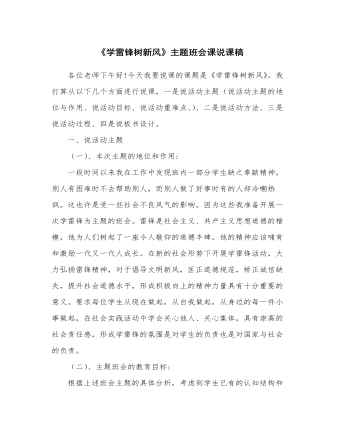
《学雷锋树新风》主题班会课说课稿
2、活动一——雷锋故事会(1)、让同学们展示课前收集的有关雷锋帮助别人的故事。使全体的同学都参与到这个活动中,发挥他们的积极性。(2)、为了丰富教育资源我在此处为学生准备了《可敬的“傻子”》、《雨夜送大嫂》、《人民的勤务员》三个故事,进行补允让学生更加全面的了解雷锋精神。设计此活动的目的是陶冶学生情操,让学生更加深入的了解勤俭朴素、助人为乐、全心全意为人民服务雷锋形象。3、活动二一一读《雷锋日记》让学生读雷锋给一位陌生老人送完手套后写的日记。重点理解“一路上,我的手虽冻得像针扎一样,心中却有一种说不出的愉快。”这一句话。让学生谈谈自己的感受。此活动的目的是让学生了解雷锋的内心世界,理解雷锋精神的实质,全心合意为人民服务。
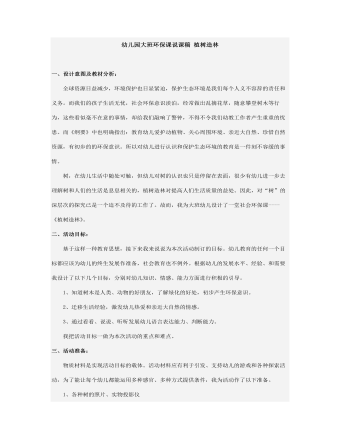
幼儿园大班环保课说课稿 植树造林
全球资源日益减少,环境保护也日显紧迫,保护生态环境是我们每个人义不容辞的责任和义务。而我们的孩子生活无忧,社会环保意识淡泊,经常做出乱摘花草,随意攀登树木等行为,这些看似毫不在意的事情,却给我们敲响了警钟,不得不令我们幼教工作者产生重重的忧患。而《纲要》中也明确指出:教育幼儿爱护动植物、关心周围环境、亲近大自然、珍惜自然资源,有初步的环保意识。所以对幼儿进行认识和保护生态环境的教育是一件刻不容缓的事情。 树,在幼儿生活中随处可触,但幼儿对树的认识也只是停留在表面,很少有幼儿进一步去理解树和人们的生活是息息相关的,植树造林对提高人们生活质量的益处。因此,对“树”的深层次的探究已是一个迫不及待的工作了。故而,我为大班幼儿设计了一堂社会环保课----《植树造林》。
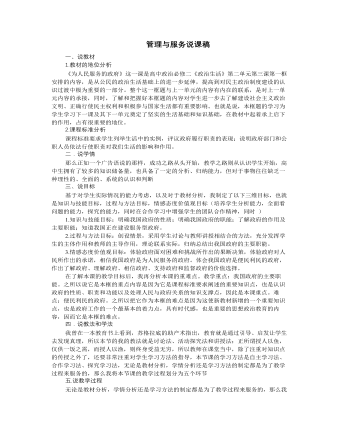
人教版高中政治必修2管理与服务说课稿
环节四 课堂小结 巩固知识本节课我采用线索性的板书,整个知识结构一目了然,为了充分发挥学生在课堂的主体地位,我将课堂小结交由学生完成,请学生根据课堂学习的内容,结合我的板书设计来进行小结,以此来帮助教师在第一时间掌握学生学习信息的反馈,同时培养学生归纳分析能力、概括能力。环节五 情景回归,情感升华我的实习指导老师告诉过我们,政治这一门学科要从生活中来到生活去,所以在课堂的最后布置了课外探究题,以此培养学生对理论的实际运用能力,同时检验他们对知识的真正掌握情况,以此达到情感的升华,本节课,我根据建构主义理论,强调学生是学习的中心,学生是知识意义的主动建构者,是信息加工的主体,要强调学生在课堂中的参与性、以及探究性,不仅让他们懂得知识,更让他们相信知识,并且将知识融入到实践当中去,最终达到知、情、意、行的统一。
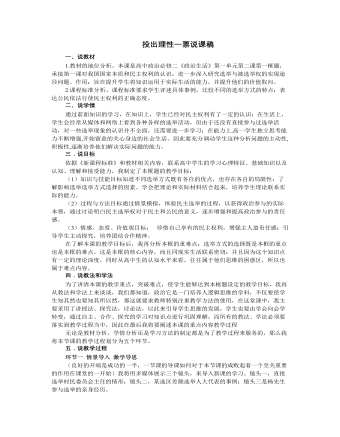
人教版高中政治必修2投出理性一票说课稿
环节三情景模拟 情感升华首先:1、本课开始观看的视频中:选出村长体现了村民参加选举的什么态度?生活中一些人“多我一票不多,少我一票不少,选举与我无关"的想法2、你如何看待上述两种不同态度?为什么?发表你的看法【教师这个过程中点拨、引导】如果我们都不珍惜自己的选举权,那么我们的国家将会出现什么后果?3、那么作为将来选民和被选举人,你们认为应具有那些政治素养才能适应?学生结合教材思考(1)(提示)不行使或不认真行使自己的选举权,意味着我们将不能选举出能为人民谋福利的当家人,意味着我们的国家将由重蹈旧中国的覆辙。(2)从态度上讲:公民应积极参加选举,认真行使这一权利,不断增强公民意识和主人翁意识,增强公民的参与感和责任感。(3)从能力上讲:要不断提高公民的政治参与能力(政治素质、文化素质、议政能力),在周全考虑、理性判断的基础上,郑重地投出自己的一票。
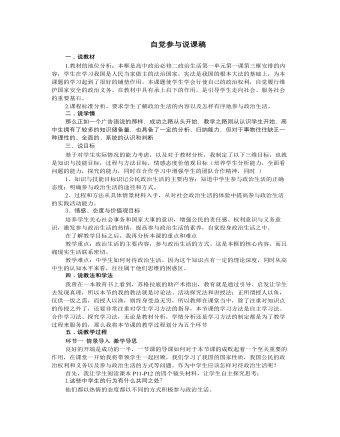
人教版高中政治必修2自觉参与说课稿
1.必须明确政治生活的作用 (政治生活与经济生活、文化生活是相辅相成的。政治生活直接影响到人民民主的实现程度,影响全体人民利益,也会影响我们的经济生活、文化生活。)2.需要学习政治知识 (5个有助于)3.需要参加政治实践活动。 (参加政治实践的途径;参加政治实践的意义)(通过情景问题,形成学生如何参与政治生活的方法;通过解决问题,培养学生解决问题的能力和发散思维的能力。)环节四 课堂小结 巩固知识本节课我采用线索性的板书,整个知识结构一目了然,为了充分发挥学生在课堂的主体地位,我将课堂小结交由学生完成,请学生根据课堂学习的内容,结合我的板书设计来进行小结,以此来帮助教师在第一时间掌握学生学习信息的反馈,同时培养学生归纳分析能力、概括能力。
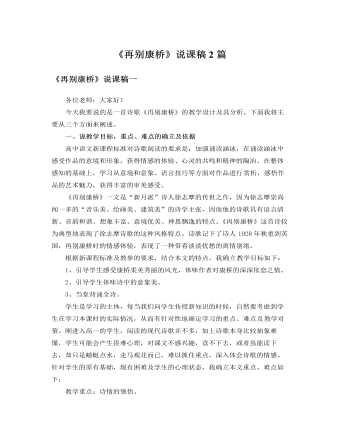
人教版高中语文必修1《再别康桥》说课稿2篇
一、教材分析1、教学对象分析《再别康桥》的教学对象是高一学生,高一学生往往对那种纯粹的、原始的、本真的情感体会较为肤浅,《再别康桥》是新月派诗人徐志摩的传世之作,有极高美学价值,它所抒发的离愁别绪是人类共同的情感经历,通过诵读容易将学生带人诗境,唤醒他们沉寂的真情,从而引起强烈的共鸣。 2、教材地位及作用 高中语文第一册第一单元为诗歌单元,本单元收录了中国现当代的一些优秀诗篇。《再别康桥》安排在本单元的第二课,属于必读课。虽然本诗向来众说纷纭,但其艺术之美人所共知,培养学生高尚的审美情趣和良好的审美创造力是语文学科的任务,因此,从语言赏析入手,从情感体验切入,就可以让学生通过学习本课体会现代诗歌的特点,多方面感受体悟诗歌的情感,受到美的熏陶。
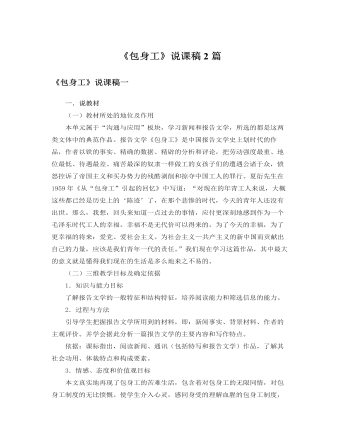
人教版高中语文必修1《包身工》说课稿2篇
(一)解题:包身工──旧社会一种变相的贩卖奴隶的形式。被贩卖的多是女孩子由承办人送到工厂做工,无人身自由,所得工资全部归承办人所有,在这种形式下做工的人也称包身工。包身工是指二三十年代(时间),在上海东洋纱厂里(地点),为外国人工作的女工(工作性质)。因为这些女工在进厂时已经签订了卖身契,失去了人身的自由权,所以被称为“包身工”。标题中的“包身”二字,突出了帝国主义、封建势力对中国女童工的残酷剥削的罪行,控诉了他们的野蛮残暴的统治手段,以激起人们的义愤和同情,这是全文的中心思想。(二)关于报告文学:《包身工》属于报告文学。(同类题材有初中的《地质之光》、《谁是最可爱的人》)报告文学,是文学体裁的一种,散文的一类,是文艺通讯、速写、特写的总称,是文学创作中的“轻骑兵”。
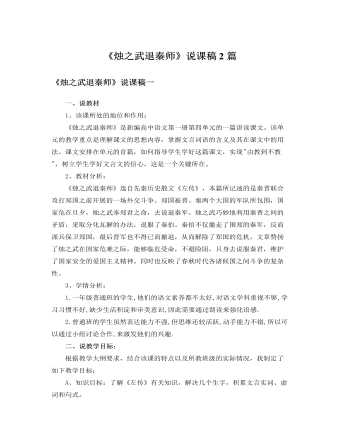
人教版高中语文必修1《烛之武退秦师》说课稿2篇
4、本文的重点是说辞,虽仅百余字,却委婉曲折,步步进逼,层层深入,表现出高超的劝说艺术、游说技巧。让学生细细品味并概括说辞中包含几层意思。第一层(“秦、晋围郑,郑既知亡矣”),分析形势,以退为进,博得好感。第二层(“若亡郑而有益于君”至“君之薄也”),亡郑陪邻,动摇联盟。第三层(“若舍郑以为东道主”至“君亦无所害”),存郑有益,利益引诱。第四层(“且君尝为晋君赐矣”至“唯君图之”),追溯历史,深入离间。可见烛之武面对大国的君主,巧舌如簧,不卑不亢,从容辞令,既不刺激对方也不失本国尊严,语言的分寸掌握得恰到好处。表现出烛之武机智善辩的外交才能。5、面对风云突变的局势,晋侯没有感情用事,而表现了清醒的头脑和理智的判断。这种隐忍不发、随机应变的胸怀和谋略,正是晋文公终成霸业的根本原因。设计意图:本环节的重点是全面把握烛之武这一人物性格特征,以及退秦师过程中体现出的非凡的胆识以及高超的谋略和语言艺术。
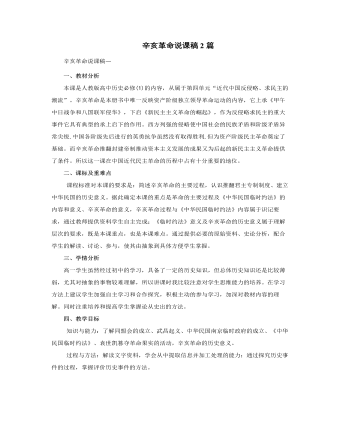
人教版高中历史必修1辛亥革命说课稿2篇
三、辛亥革命的结局1.袁世凯窃取革命果实由课件给出窃取革命果实的简单过程,帮学生理清思路,创设问题情境,由学生分析革命果实被窃取的原因,教师给以补充并揭示根本原因,贯穿整个革命的资产阶级的软弱性和妥协性,再次加深对难点的理解。2.历史功绩辛亥革命性质、功绩由学生阅读书本进行总结,再加以补充让学生在书本上做好记录,强调最大功绩是结束了两千多年的君主专制政体。辛亥革命的失败及其评价很易搞成生硬的一言堂形式,可以从多种角度把学生思维调动起来。这里采用列举一个合作探究,自由讨论的题目“有人认为辛亥革命因为没有完成反帝反封建的革命任务而失败,有人则认为辛亥革命是中国“从君主到民主”社会转型的成功开始。你同意哪种看法?”要求同学们自由讨论.各抒己见,大胆创新,言之在理即可.教师在一旁引导学生,活跃课堂气氛.最后教者归纳总结学习历史从不同的角度看问题可以得出不同的结论,学会用辩证的观点看待历史问题,对辛亥革命有个全面的认识。

人教版高中历史必修1鸦片战争说课稿2篇
“第二次鸦片战争”爆发的原因的讲析,可通过出示英国在鸦片战争后在中国与洪都拉斯的正当贸易对比表,让学生观察和创设情景来得出结论。战争的经过及影响,可以通过两次鸦片战争形势图,以及一张相关的表格,从战争的根本目的、性质、过程及影响等方面来比较两次战争的异同,从而让学生理解掌握“战火再燃”其实就是中英鸦片战争的继续和扩大。并理解“第二次鸦片战争”的如何使中国社会半殖民地半封建化的程度大大加深了。并突出英法两国殖民者在占领北京期间所犯的滔天罪行。3、结:结合板书设计,让生自己总结这节课所学的内容,并通过课后习题练于讲相结合,来巩固本课知识。在此基础上对本课线索及主要知识点进行简要的梳理。4、课题延伸:教材后探究学习总结中的一段材料,即《英国驻华商务监督义律致英国外交大臣巴麦尊的机密件》,让学生究义律对中国发动鸦片战争原因的说辞来展开探讨,启发学生运用辨证唯物主义的基本观点,澄清和批驳在在一问题上的一些错误和谬论,从而提高学生辨别是非的能力和批判的能力.

人教版高中生物必修2伴性遗传说课稿
(1观察图解,色盲基因在性别间是如何传递的呢?(女--女、女--男、男--女)(2)为什么不能由男性传给男性?(色盲基因是在X染色体上,因此色盲基因是随X染色体的传递而传递。)(3)男性的色盲基因怎样才能传给男性呢?(通过女儿,传给外孙即交叉遗传)(4)从图解看色盲在男女中的发病情况怎样?(男性多于女性)(5)从社会调查也是这样,你是否能从基因和染色体的角度加以解释?(提示:女性染色体的构成,结合基因位置及显隐性进行分析)归纳特点:归纳出色盲基因遗传的特点并扩展到X染色体隐性遗传的特点上。色盲基因遗传(X隐性遗传)的特点:(1)男患者多于女患者(2)交叉遗传(3)女病儿子必病,男正女儿必正等。问题探讨:利用“遗传图解”结合“问题链”继续探讨,拓展到抗维生素D即X 染色体显性遗传的特点。(6)色盲基因在X染色体上属隐性基因,子代表现男多于女,对应的正常色觉基因则属于X显性基因,子代表现应如何?(女多于男)
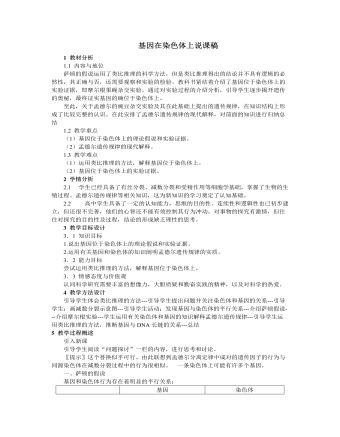
人教版高中生物必修2基因在染色体上说课稿
三、孟德尔遗传规律的现代解释①分离定律:在杂合体的细胞中,位于一对同源染色体上的等位基因,具有一定的独立性;在减数分裂形成配子的过程中,等位基因随同源染色体的分开而分离,独立地随配子遗传给后代。②自由组合定律:位于非同源染色体上的非等位基因的分离或组合是互不干扰的;在减数分裂过程中,同源染色体的等位基因彼此分离的同时,非同源染色体上的非等位基因自由组合。总结:再次强调孟德尔遗传定律的现代解释课堂练习:书本31页6、教学反思:本节课设置了一系列问题情境,层层设问,在学生答问、质疑、讨论过程中让学生建构新概念和新的知识体系,并通过教师及时掌握反馈信息,适时点拨、调节,让学生在推理判断中培养良好的思维习惯和对知识的迁移能力,而且通过留出一定的时间让学生提问,体现了以学生为主体的思想。
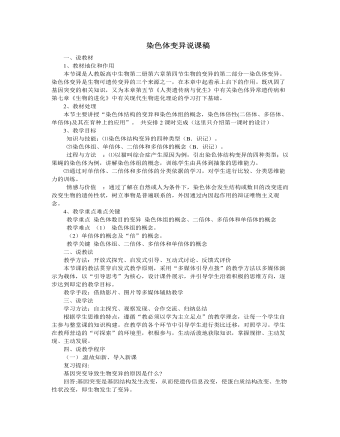
人教版高中生物必修2染色体变异说课稿
四、说教学程序(一).温故知新、导入新课复习提问:基因突变导致生物变异的原因是什么?回答:基因突变是基因结构发生改变,从而使遗传信息改变,使蛋白质结构改变、生物性状改变,即生物发生了变异。那么,基因是什么?它和染色体又有何关系?回答:基因是有遗传效应的DNA片断,染色体是DNA的载体,基因在染色体上呈线形排列。引出新知:对于一个生物体来说,正常情况下,其染色体的结构和数量都是稳定的。但在自然条件或人为因素的影响下,染色体的结构和数量均会发生改变,从而导致生物性状的改变,这就属于染色体变异。(二).把握重点、突破难点重点的把握:1、染色体结构的变异播放影片:猫叫综合征幼儿。让学生观察: 患儿哭声轻、音调高,很像猫叫。教师补充: 患儿的征状---两眼较低、耳位低下,存在着严重的智力障碍。阐述病因---染色体片段缺失

